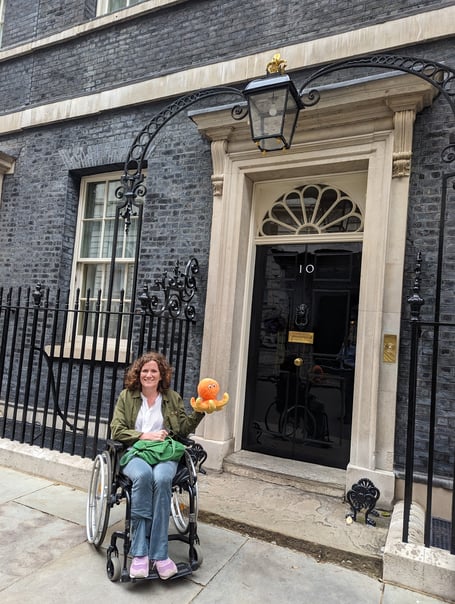Haslemere resident Ailsa Guidi travelled to Downing Street last Monday to speak to MPs and Lords about the reality of living with progressive multiple sclerosis (MS).
At a Downing Street ‘round-table’ event, organised by the MS Society, Ailsa addressed various decision makers, including the prime minister’s special advisor and the chair of the All Party Parliamentary Group on MS.
Ailsa, who is 47, lives with secondary progressive MS and is now a full-time wheelchair user.
Like many people with the condition, she isn’t eligible for any disease-modifying treatments. But she is taking part in a new clinical trial called Octopus, funded by the MS Society, which aims to find new treatments for people living with progressive MS.
Ailsa was given an orange octopus at the start of the trial, and she took it along with her to Downing Street.
“I think it's the first time an octopus has ever gone through Downing Street security,” said Ailsa. “It was a real privilege to be there.”
Ailsa was first diagnosed with multiple MS in 1999 at just 24 years old. But in February 2022, Ailsa was re-diagnosed with secondary progressive MS.
“It’s like I’m at the top of a downward slope, and I don’t know how steep that slope is,” said Ailsa.
Despite the challenges of her condition, Ailsa doesn’t let MS stop her. At the 'round-table' she spoke about her experience taking part in Octopus, a new clinical trial aimed at helping those living with MS, explaining why the trial is so important, and why it’s so vital that the government invests in neurological services.
Ailsa said: “I feel it’s really important to show MPs and decision-makers that there is amazing progress happening in MS research – like Octopus, which is a world-first trial.
“But at the same time, we need infrastructure in place to make sure that any new treatments found through clinical trials can reach people.
“Having the chance to speak in front of MPs and Lords was really significant. It’s important they understand how challenging it can be to live with MS, and how much of a knock-on impact MS can have on friends, family, and carers.”





Comments
This article has no comments yet. Be the first to leave a comment.